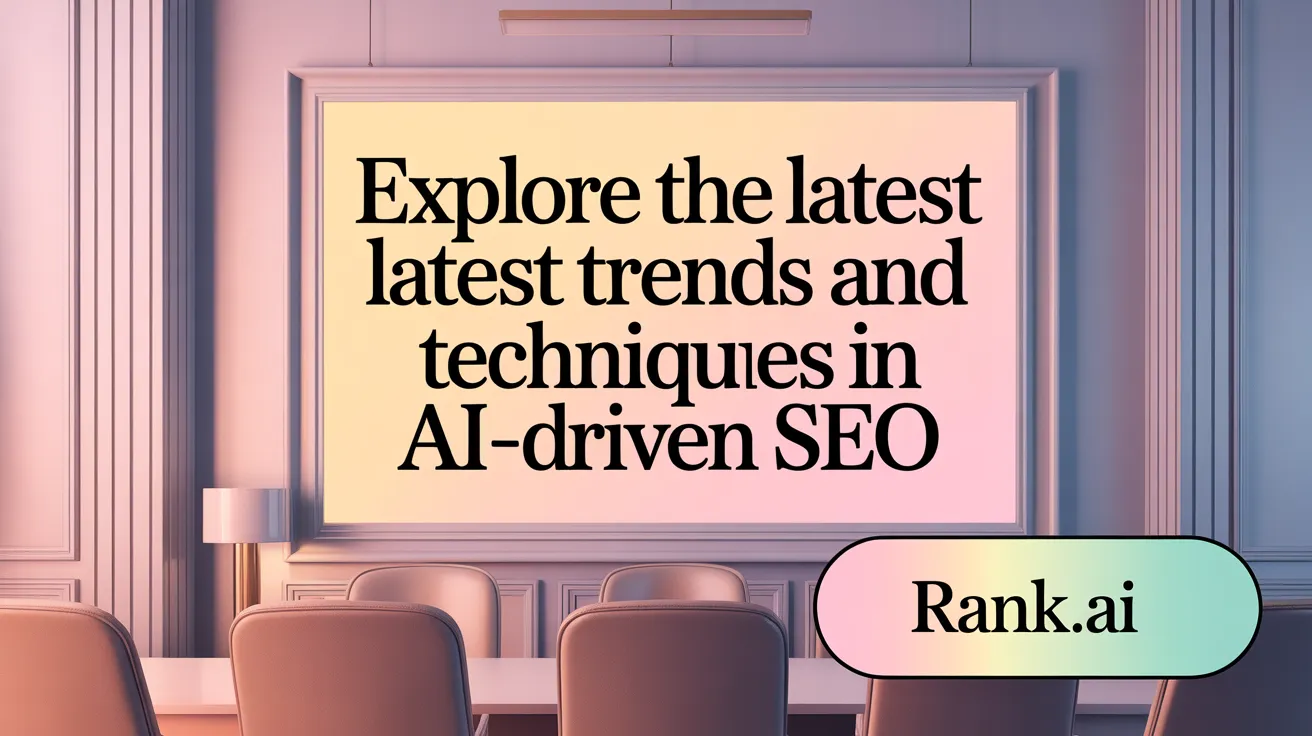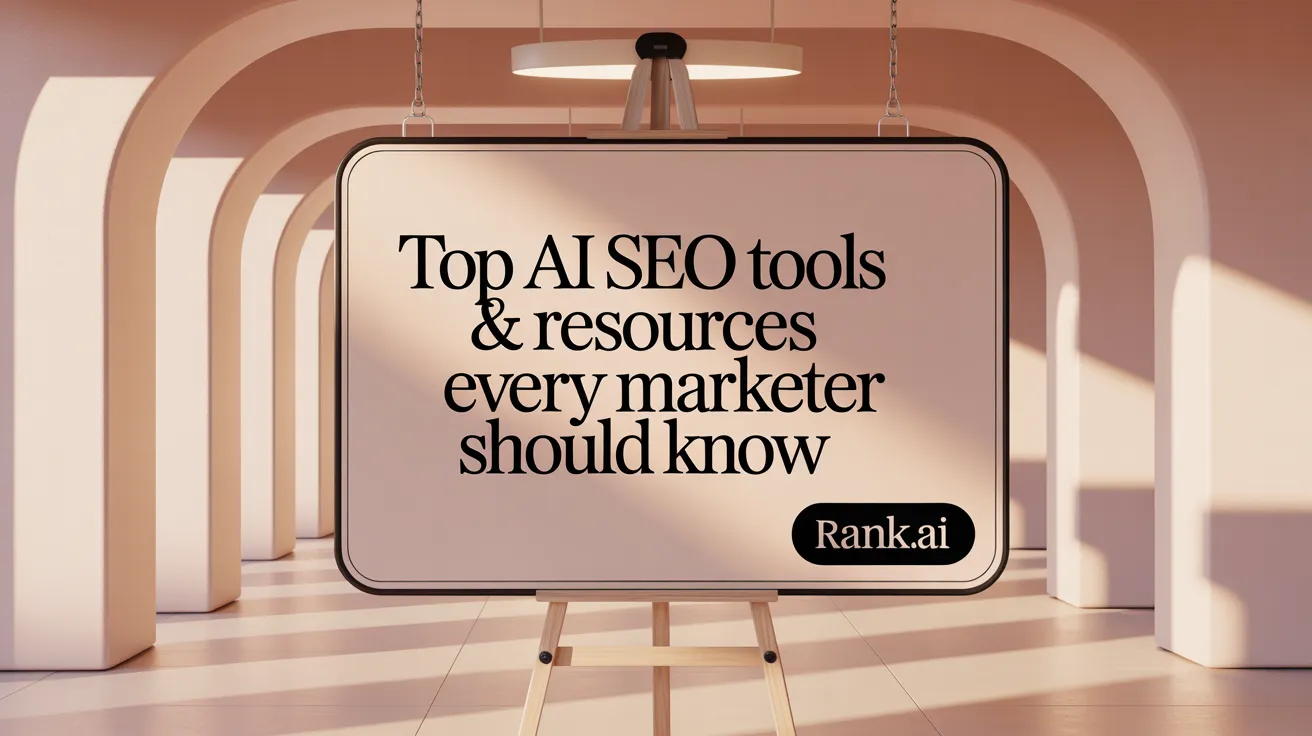Navigating the Future of SEO with AI
As artificial intelligence reshapes digital marketing landscapes, mastering AI-powered SEO services emerges as the key to securing unmatched market dominance. This article explores cutting-edge strategies, tools, and trends designed to elevate businesses above their competition by leveraging AI’s transformative potential in search engine optimization.
Strategic Foundations: How AI Fuels Market Domination in SEO
How can businesses use AI-driven keyword research to dominate markets?
AI-powered keyword research is transforming how businesses identify the most valuable search terms. These tools analyze massive datasets quickly, uncovering high-volume keywords, long-tail phrases, and conversational queries that might be missed with traditional methods.
By understanding user intent more precisely, companies can target keywords that resonate with their audience, increasing relevance and search visibility. AI also predicts trending keywords, allowing businesses to create timely content that captures emerging market interests.
What role does automation and technical optimization play in AI-enhanced SEO?
Automation is central to modern SEO strategies. AI tools can handle technical tasks such as optimizing site architecture, implementing schema markup, managing hreflang tags for international SEO, and improving loading speeds.
These automation features ensure websites stay compliant with evolving search engine algorithms, reduce manual effort, and improve overall site health. Continuous monitoring and adjustment enable websites to adapt swiftly to algorithm updates and technical SEO challenges.
How does personalization through AI improve content recommendations?
AI enhances personalization by analyzing user behavior, preferences, and search history to recommend relevant content. This targeted approach increases user engagement and time spent on site.
Personalized content strategies driven by AI help in crafting tailored experiences for different audience segments, boosting conversions. AI-driven insights also enable content creators to focus on topics and formats that will perform best, strengthening overall SEO efforts.
In what ways can AI optimize voice and visual search?
Voice and visual search are rapidly growing areas where AI plays a pivotal role. AI algorithms process natural language to better understand voice queries, enabling brands to optimize content for conversational search.
For visual search, AI analyzes images to identify objects and context, allowing businesses to optimize images and visual content. This expands reach into new search spaces and improves accessibility for users using smart devices and voice assistants.
How can blending human expertise with AI automation create a robust SEO strategy?
While AI handles data analysis, technical optimization, and content automation efficiently, human expertise remains vital for creativity, cultural insights, and strategic decision-making.
Combining AI tools with human oversight ensures content quality aligns with brand voice and E-A-T (Experience, Expertise, Authority, Trustworthiness) standards. This hybrid approach maximizes the strengths of technology and human judgment, maintaining competitiveness and adapting to search engine innovations.
| Strategy Area | AI Application | Human Integration | Benefit |
|---|---|---|---|
| Keyword Research | Large dataset analysis | Strategic focus on target markets | Precise targeting and trend prediction |
| Technical Optimization | Automating site fixes | Supervision for brand consistency | Improved performance and compliance |
| Content Personalization | User behavior analysis | Content creation and editorial oversight | Increased engagement and conversions |
| Voice & Visual Search | Optimized for natural language and image data | Cultural insights, creativity | Expanded reach, improved accessibility |
| Human + AI in SEO | Data-driven decisions + creative strategies | Cultural and cultural relevance expertise | Robust, adaptive SEO strategies |
Embracing AI-driven strategies across these areas empowers businesses to gain a competitive edge, ensuring dominance in evolving digital markets.
Transforming SEO: Understanding AI’s Impact on Market Leadership
How does AI impact SEO strategies to achieve market dominance?
AI is revolutionizing the way businesses approach search engine optimization (SEO), enabling them to secure market leadership through smarter strategies. One of the primary ways AI influences SEO is by enhancing search engines' ability to understand user intent. Advanced natural language processing models such as BERT, MUM, and RankBrain analyze vast amounts of data to interpret complex queries with greater accuracy.
This improved understanding allows content creators to optimize for semantic search, focusing on context, long-tail keywords, and conversational queries. As more users adopt voice search and AI-driven summaries like Google Overviews, aligning content with these search behaviors becomes critical.
In addition to better understanding user intent, AI tools automate many SEO tasks, improving both efficiency and precision. From conducting technical audits and optimizing metadata to content generation and personalization, AI reduces manual effort and minimizes errors. Popular tools like Semrush, SurferSEO, and Google's NLP APIs assist in semantic keyword analysis, topic clustering, and on-page improvements.
Predictive analytics and competitor analysis are crucial components of AI-powered SEO strategies. These technologies enable businesses to anticipate market trends, identify emerging opportunities, and adapt swiftly to updates in search engine algorithms. By analyzing competitor backlink profiles, keyword gaps, and content strengths, companies can refine their tactics to stay ahead.
Ultimately, AI-driven SEO enhances organic visibility and content relevance by delivering personalized, high-quality experiences to users. This combination of improved technical SEO, strategic content, and predictive insights positions brands to dominate their markets. By integrating AI into SEO efforts, organizations can achieve sustainable growth, outperform competitors, and establish themselves as industry leaders in an increasingly digital and competitive landscape.
Cutting-Edge Trends and Techniques in AI-Driven SEO

What are the emerging trends and techniques in AI-driven search engine optimization?
As we move further into 2025, AI is transforming how businesses approach SEO. One prominent trend is the use of natural language processing (NLP) and semantic analysis. These tools help search engines better understand the intent and context behind user queries, allowing marketers to optimize content more effectively for natural, conversational search.
Voice and visual search are becoming integral to SEO strategies. AI-powered tools enable businesses to tailor content for voice queries and visual recognition, tapping into the growing popularity of smart speakers and image-based searches. Optimizing for these modalities involves including long-tail voice keywords, structured data, and visual elements that enhance discoverability.
Predictive analytics is another key development. By analyzing large datasets in real time, AI tools can forecast upcoming trends, identify shifting user preferences, and adapt search strategies accordingly. This proactive approach helps brands stay ahead of algorithm updates and customer interests.
Real-time SERP (Search Engine Results Page) adaptation allows companies to monitor search performance continuously and modify their tactics instantaneously. This agility ensures content remains relevant and competitive amidst frequent search engine algorithm changes.
A major shift in SEO focus is moving toward intent-based strategies. Instead of solely targeting keywords, businesses aim to match content with user intent, emphasizing authority, freshness, and adherence to E-E-A-T (Experience, Expertise, Authority, and Trustworthiness) principles to boost rankings.
Finally, diversification beyond traditional search engines is vital. With AI-powered answer engines, social platforms, and alternative search channels gaining prominence, optimizing across multiple platforms ensures resilience and broader visibility. This multifaceted approach helps businesses thrive in an AI-driven search landscape, leveraging the latest techniques to attract relevant traffic.
| Trend Focus | Techniques and Benefits | Examples of AI Tools/Strategies |
|---|---|---|
| Natural Language & Semantic Analysis | Improved understanding of user intent; better content targeting | Google NLP APIs, SurferSEO |
| Voice & Visual Search | Capture voice and image search traffic; enhanced mobile experience | Schema markup, voice keyword optimization |
| Predictive Analytics | Anticipate search trends; optimize proactively | SEMrush predictive tools, MarketMuse |
| Intent-Based SEO | Align content with user goals; improve authority scores | E-E-A-T frameworks, topical clustering |
| Diversification Channels | Broaden reach beyond Google; optimize social and answer engines | HubSpot, Perplexity, ChatGPT Plugins |
Staying current with these trends ensures that SEO strategies remain effective and adaptable in the rapidly evolving AI-powered digital landscape.
Essential AI SEO Tools and Resources for Today’s Marketers

Which tools and resources are effective for leveraging AI in SEO strategies?
In the rapidly evolving landscape of SEO in 2025, leveraging the right AI-powered tools can significantly improve search engine rankings and digital marketing effectiveness. Popular platforms like Semrush and Ahrefs excel in advanced keyword research, analyzing large datasets swiftly to uncover hidden opportunities and predicting future search trends. These tools help marketers identify keywords that resonate with user intent and optimize content accordingly.
Content optimization is streamlined by tools such as Surfer SEO and MarketMuse. Surfer SEO provides data-driven recommendations for on-page elements like headers, internal links, and schema markup, enhancing overall site relevance. MarketMuse utilizes AI to generate content strategies rooted in domain authority and content depth, ensuring content aligns with search algorithms.
Technical SEO automation benefits from platforms like Google Search Console and HubSpot. Search Console offers insights into site performance issues, Core Web Vitals, and indexing, while HubSpot integrates AI to assess technical health, identify Crawl errors, and automate site audits.
For content creation and competitor analysis, tools like Jasper and Frase are invaluable. Jasper uses natural language processing to produce high-quality content drafts quickly, and Frase provides in-depth competitor analysis, content opportunities, and predictive analytics, making it easier to craft targeted, engaging content.
Integrating AI SEO solutions into existing workflows requires scalable platforms that can adapt to diverse needs. Ensuring seamless compatibility with current marketing tools, data security, and transparency in AI processes is vital. Many leading providers now offer extensive API integrations, allowing marketers to customize their AI applications and automate routine tasks efficiently.
In conclusion, selecting the right mix of AI tools—spanning keyword research, content optimization, technical auditing, and content creation—enables marketers to maintain a competitive edge. These resources not only enhance accuracy and efficiency but also foster strategic decision-making, ultimately boosting search visibility and online presence.
| Tool Category | Leading Platforms | Key Features | Compatibility & Use Cases |
|---|---|---|---|
| Keyword Research | Semrush, Ahrefs | Trend prediction, search volume analysis | Integration with content planning tools |
| Content Optimization | Surfer SEO, MarketMuse | On-page suggestions, content gap analysis | Scalability for blogs and eCommerce sites |
| Technical SEO | Google Search Console, HubSpot | Site health monitoring, audit automation | Real-time performance tracking |
| Content Generation | Jasper, Frase | AI writing, competitor insights | Content strategy, blog posts, product pages |
| Integration & Scale | Custom APIs, platform-specific solutions | Automation, data management | Large enterprise or multi-channel marketing |
By combining these advanced AI tools, marketers can elevate their SEO strategies, deliver personalized user experiences, and stay ahead in competitive digital markets.
Amplifying SEO Performance: AI’s Role on Global and Local Fronts

How do AI enhancements improve SEO performance on both global and local scales?
AI-driven tools and strategies are transforming search engine optimization in profound ways, benefiting both international and local businesses. On a global level, AI enables marketers to analyze vast datasets across different languages, regions, and cultures. Automation of technical SEO tasks such as managing hreflang tags, optimizing site structures for multi-region audiences, and tracking international trends ensures campaigns are timely and effective. For example, advanced AI tools can automatically implement hreflang tags, which indicate language and regional targeting, helping websites rank appropriately in regional search results.
Simultaneously, AI provides competitor analysis and predictive trend forecasting. These capabilities help businesses anticipate market shifts, refine their global content strategies, and measure performance improvements. Studies show that global SEO efforts supported by AI can see an average performance boost of around 65% within just a few months.
Locally, AI enhances SEO by focusing on geographically relevant keywords and optimizing for local search behaviors. AI-powered tools facilitate citation management, ensuring consistency of business information across directories. They analyze search intent in specific communities, enabling the creation of hyperlocal content that aligns closely with community interests and needs.
Moreover, AI tools improve local visibility by streamlining Google Business Profile management — updating descriptions, posting updates, and managing reviews automatically. Reputation management is also strengthened through sentiment analysis, where AI assesses customer reviews for sentiment, automates responses, and highlights areas for improvement. These actions increase trust, engagement, and prominence in local search results.
In summary, AI enhances SEO by automating complex tasks, providing predictive insights, and offering cultural intelligence. This results in measurable improvements, reduced manual effort, and a seamless ability to target diverse markets. Businesses leveraging these AI capabilities enjoy a competitive edge, ensuring their websites are optimized for both broad and niche audiences in today’s increasingly digital global landscape.
Evaluating AI-Powered SEO Solutions for Effective Market Growth
How can businesses evaluate and compare AI-powered SEO solutions to drive market growth?
When considering AI-driven SEO tools, companies should focus on how these solutions deliver precise and actionable insights. Look for platforms that process large datasets quickly to uncover keyword opportunities, analyze competitors, and predict future trends—all essential for gaining a competitive edge.
Automation capabilities are also vital. The best AI tools automate content creation, technical audits, and real-time performance monitoring, saving time and ensuring continuous optimization. This allows businesses to scale their SEO efforts efficiently without compromising quality.
Assessing performance metrics helps gauge the effectiveness of an AI solution. Metrics such as increases in organic traffic, improved search rankings, and higher conversion rates, coupled with a clear demonstration of return on investment (ROI), reinforce the value of the tool.
Integration with existing systems is another important factor. Ideal solutions seamlessly connect with current marketing platforms, website CMS, and analytics tools, facilitating smooth workflows and better data management.
Additionally, effective AI SEO tools adapt to ongoing changes in search engine algorithms, especially updates driven by AI like Google’s Search Generative Experience. The capability to stay current and refine strategies automatically is a significant advantage.
Finally, reviewing case studies and seeking strong user support ensures the chosen solution has a proven track record. A comprehensive platform that offers ongoing support and training can help companies maximize their AI investment and sustain market growth.
By balancing data accuracy, automation, performance outcomes, adaptability, and support, businesses can select AI SEO solutions that effectively enhance their digital presence and expand their market reach.
Gaining Competitive Advantage with AI-Powered SEO in the Digital Era
In 2025, businesses harness the power of AI-driven SEO strategies to gain a distinct edge in competitive markets. Modern AI tools enable more efficient content optimization and prediction of emerging search trends, allowing companies to stay ahead of the curve.
Automation plays a crucial role, streamlining research and technical SEO tasks. From conducting keyword analysis to implementing site audits, AI tools like Semrush, SurferSEO, and Google NLP APIs make these processes faster and more accurate. This automation reduces costs and frees up human resources for strategic initiatives.
Establishing authority and relevance is essential for high rankings. AI helps create deep, tailored content that aligns with user intent and incorporates semantic keywords. Features like Google's Search Generative Experience emphasize the importance of authoritative, well-structured content that resonates with both users and AI algorithms.
Leveraging the latest AI advancements, such as predictive search intent analysis, enables businesses to anticipate consumer needs and adapt content proactively. This approach enhances visibility in niche markets by targeting specific queries and emerging topics early on.
Furthermore, AI insights facilitate targeting underserved or niche audiences, gaining early search prominence and citation opportunities. By continuously monitoring search landscape shifts, AI ensures strategies remain resilient and adaptable.
Ultimately, integrating AI into SEO efforts empowers businesses to optimize content effectively, personalize user experiences, and remain highly competitive. This long-term advantage helps organizations differentiate themselves, improve rankings, and execute marketing strategies with foresight and agility.
Integrating AI with Human Expertise: The Hybrid SEO Approach
Balancing automation with human oversight
As AI tools become increasingly integral to SEO strategies, maintaining a balance between automation and human input is crucial. Automated systems efficiently handle data analysis, keyword research, and technical optimizations, freeing up time for strategic thinking. However, human oversight ensures that content remains relevant, engaging, and aligned with brand voice. Professionals review AI recommendations, customize strategies, and ensure that automation supports overall business goals.
Ensuring E-A-T and content quality
Google emphasizes E-A-T—Experience, Expertise, Authoritativeness, and Trustworthiness—as vital for high rankings. While AI can generate and optimize content at scale, human expertise guarantees authenticity and depth. Content creators add personal insights, verify factual accuracy, and enhance authority, ensuring AI-driven content meets quality standards and resonates with targeted audiences.
Cultural intelligence and localization
Adapting SEO efforts to diverse markets requires cultural understanding. AI can analyze regional search trends and optimize local keywords, but human involvement is essential for cultural nuances and context. Localization experts tailor content, tone, and messaging to specific markets like Columbus, Ohio or international regions, ensuring relevance and effectiveness.
Human-in-the-loop for ethical AI use
Responsible AI deployment involves humans overseeing AI decision-making processes. This prevents biases, upholds ethical standards, and addresses sensitive topics appropriately. Human reviewers validate AI outputs, monitor for unintended consequences, and ensure that SEO practices adhere to ethical guidelines.
Comprehensive strategies blending AI and human creativity
The most successful SEO approaches combine AI’s efficiency with human creativity. Automation handles routine tasks while content creators craft compelling narratives and innovative ideas. This hybrid approach yields a scalable, effective, and ethical SEO strategy, leveraging AI’s speed and humans’ nuanced understanding to stay ahead in dynamic markets like local SEO and global campaigns.
AI-Powered Content Generation: Enhancing Quality while Maintaining Authority
How is AI augmenting writing and content planning?
AI tools like ChatGPT, Frase, and MarketMuse are revolutionizing content creation by enabling rapid generation of ideas, outlines, and drafts. These platforms analyze vast datasets to suggest relevant topics and keywords, helping marketers plan content that aligns with current search trends and user intent.
How do companies ensure that content remains authoritative and trustworthy?
While AI accelerates content development, human oversight is crucial. Incorporating expert insights, verifying facts, and following E-A-T principles (Experience, Expertise, Authority, Trustworthiness) ensure content is credible. AI assists with surface-level optimization, but human editors validate content quality and relevance.
What is the role of semantic keywords in AI-driven content?
AI tools facilitate semantic keyword analysis, enabling the creation of content that captures related terms and context. This enhances understanding by search engines, improves ranking, and ensures content resonates with user intent—particularly important in voice and visual searches.
How do we balance automation with editorial oversight?
Automation simplifies routine tasks like keyword integration, metadata, and basic content drafts. However, human editors refine the tone, ensure factual accuracy, and align content with brand voice. This hybrid approach maintains high quality while increasing efficiency.
How does AI help create targeted, user-focused content?
AI analyzes user behavior, search history, and intent signals to craft content tailored to audience needs. Predictive analytics identify trending topics and optimize content timing, ensuring relevance and engagement—ultimately boosting search performance.
The Future of SEO: Preparing for AI-Driven Search Experiences

Optimizing for Large Language Model (LLM) Search
As AI-powered large language models (LLMs) like ChatGPT and GPT-4 become integral to search experiences, SEO strategies must evolve. Unlike traditional keyword-focused tactics, LLM optimization involves structuring content for natural language queries. This includes using conversational phrases, answering specific questions clearly, and providing comprehensive, structured data.
AI tools now assist in crafting content that aligns with how LLMs interpret user intent. They analyze semantic relevance and help create longer, detailed content that directly addresses user needs, ensuring better visibility in AI-generated responses.
Strategies for Voice and AI Answer Engines like ChatGPT
Voice search and AI answer engines demand an emphasis on natural language and long-tail keywords. Optimizing for these means focusing on question-based queries and providing concise, authoritative answers.
Businesses should incorporate FAQs, featured snippets, and voice-friendly keywords into their content. AI-driven tools analyze voice search trends and suggest enhancements to improve rankings in voice-activated queries.
Real-time Adaptation to Algorithm Changes
AI allows SEO professionals to monitor and respond to search engine updates instantly. By analyzing search data and ranking fluctuations, AI tools enable dynamic adjustments—such as updating content, refining keywords, or optimizing technical elements—to maintain and improve search rankings.
This continuous feedback loop ensures resilience against algorithm shifts, keeping strategies aligned with the latest AI and machine learning-based ranking factors.
Expanding SEO Beyond Traditional Search Engines
The rise of AI and conversational agents broadens SEO scope beyond Google or Bing. Platforms like social media voice assistants, AI-powered chatbots, and personalized content feeds require tailored SEO approaches.
To capitalize on this, businesses optimize content for multiple channels and leverage AI tools to understand platform-specific user behaviors, ensuring visibility across varied AI-driven environments.
Harnessing AI for Proactive Market Positioning
Future SEO success depends on predictive analytics. AI anticipates trends, identifies emerging search queries, and suggests content opportunities before competitors react.
By leveraging AI insights, companies can proactively develop content, optimize user experiences, and position themselves as industry leaders in relevant topics.
| Aspect | Focus Area | AI Tool Examples | Insights Provided |
|---|---|---|---|
| Content Optimization | LLM and Voice Search | SurferSEO, Frase | Semantic analysis, topic relevance |
| Real-time Adjustment | Algorithm Monitoring | Google Search Console, HubSpot AI | Performance tracking, rapid updates |
| Market Trends | Predictive Analytics | MarketMuse, ChatGPT | Trend forecasting, competitive gaps |
| Cross-Channel SEO | Multi-platform Optimization | Ahrefs, SEMrush | Platform-specific strategies |
Adapting to this evolving landscape requires blending automation with human expertise. Staying current with AI advancements and integrating these tools into your broader marketing efforts will be essential to thrive in the future of search.
Measuring Success: Key Metrics in AI-Enhanced SEO Environments
Tracking organic traffic and click-through rates
In AI-driven SEO strategies, monitoring organic traffic and click-through rates (CTR) remains fundamental. These metrics reveal how well optimized content attracts users and encourages engagement. AI tools can analyze patterns over different timeframes and segments, enabling marketers to swiftly identify what’s working and what needs adjustment.
Keyword ranking performance
Keyword rankings continue to be a vital indicator of SEO health. AI enhances this process by providing real-time updates and predictive insights into how target keywords are performing across diverse regions and devices. This proactive tracking helps refine keyword strategies for sustained visibility.
Engagement metrics
User engagement metrics, such as bounce rates, session duration, and pages per session, help assess the quality and relevance of content. AI platforms analyze these behaviors to optimize content layout, internal linking, and user experience, ultimately driving higher retention and conversion rates.
Technical health indicators like Core Web Vitals
Technical website health influences search rankings significantly. AI tools routinely check core web vitals—loading speed, interactivity, and visual stability—and suggest improvements. Maintaining optimal scores in these areas ensures a smoother user experience and better SEO results.
Link profile strength and competitor benchmarking
A robust backlink profile supports higher authority and ranking potential. AI facilitates continuous analysis of backlinks, identifying new opportunities and potential harmful links. Comparing with competitors through benchmarking helps in shaping more effective link-building strategies.
| Metric | Purpose | AI Capabilities |
|---|---|---|
| Organic Traffic & CTR | Measure visibility and user interest | Real-time insights, trend analysis |
| Keyword Rankings | Track keyword performance across markets | Predictive ranking trends, updates |
| Engagement Metrics | Evaluate content relevance and user experience | Behavior analysis, personalization |
| Core Web Vitals | Ensure technical optimization for user experience | Automated audits, suggestions |
| Backlink & Competitor Analysis | Strengthen authority and competitive edge | Continuous monitoring, benchmarking |
Scaling AI SEO Strategies Across Multiple Markets and Languages

How can businesses analyze multiple international markets simultaneously?
AI-driven SEO tools excel at processing vast amounts of search data across different countries and languages at the same time. These tools analyze regional search patterns, user behavior, and keyword trends efficiently, enabling businesses to identify promising markets quickly.
By leveraging predictive analytics, companies can forecast the potential ROI of targeting specific regions, helping prioritize efforts and allocate resources more effectively. Real-time monitoring allows brands to adapt their strategies based on regional shifts in search trends.
What are the considerations for multilingual SEO optimizations?
Optimizing for multiple languages requires more than translation. AI tools assist in creating culturally relevant content tailored to local audiences. These platforms analyze local search intent, idiomatic expressions, and behavioral nuances.
For instance, AI can suggest relevant long-tail keywords and cultural cues that resonate with regional users. This detailed approach enhances visibility in regional search results and improves engagement.
How does AI help predict and incorporate cultural relevance and local search trends?
AI's ability to analyze cultural nuances is crucial for international SEO. It evaluates seasonal trends, local events, and cultural factors influencing search behavior.
Using this data, businesses can time their content launches and promotions for maximum impact. AI also helps craft content that aligns with local customs and preferences, fostering stronger community connections and trust.
How can automated hreflang tags and site structure improve international SEO?
Proper implementation of hreflang tags ensures that users are directed to the appropriate regional content. AI tools automate the creation and management of hreflang codes, reducing errors, and streamlining multilingual site structures.
AI also assists in organizing site architecture to cater to different language versions, ensuring that each version is optimized for local searches and user experience.
What role does cross-region competitive intelligence play in scaling SEO efforts?
AI-powered competitive analysis reveals what local competitors are doing—keywords, backlinks, content strategies, and more. This intelligence enables brands to identify gaps and opportunities specific to each market.
By adapting successful tactics from other regions, businesses can develop targeted strategies that resonate with local audiences, helping to boost rankings and increase market share.
| Aspect | AI Capabilities | Benefits | Example Use Cases |
|---|---|---|---|
| Market Analysis | Data processing across countries | Faster, real-time insights | Identify emerging markets early |
| Multilingual Optimization | Language modeling and cultural analysis | Enhanced relevance and engagement | Localized content creation |
| Trend Prediction | Seasonal and event-based data analysis | Timing content effectively | Launch campaigns aligned with local festivals |
| Site Structure | Automated hreflang management | Reduced errors, better indexing | Multi-language site setup |
| Competitive Intelligence | Competitor keyword and backlink monitoring | Strategic advantage | Outperform regional competitors |
By combining these advanced AI techniques, global businesses can scale their SEO strategies efficiently across diverse markets, resulting in better visibility, higher engagement, and increased revenue.
Optimizing Local SEO with Artificial Intelligence for Community Impact
How does AI enhance local keyword research and behavioral analysis?
AI-powered tools can analyze large amounts of search data to identify high-potential local keywords and understand user behavior. These tools track behavioral patterns, such as search intent and popular local queries, providing insights into what community members are looking for. This helps businesses tailor their content and SEO strategies to meet local needs more effectively.
How can AI-driven citation management and Google Business Profile optimization benefit local SEO?
AI automates the management of citations and Google Business Profiles by updating details, posting new content, and managing reviews automatically. This ensures information accuracy and consistency across directories, boosting local search ranking signals. Automated reviews response and profile updates keep the business engaged and relevant in local search results.
What role does AI play in voice search and review sentiment analysis?
AI analyzes voice search patterns and identifies common voice queries in the community, allowing local businesses to optimize content accordingly. Sentiment analysis algorithms evaluate reviews and social media mentions, providing insight into customer satisfaction levels. This enables businesses to respond proactively and enhance their reputation.
How does AI facilitate automated reputation management?
AI tools monitor reviews and social media for sentiment, automating responses where appropriate. They identify negative feedback early and suggest ways to address concerns. This continuous oversight helps maintain a positive online reputation, which is crucial for local SEO success.
How can AI assist in creating hyperlocal, culturally resonant content?
AI generates content tailored to the community’s cultural context, language, and local events. It predicts trending topics and helps craft messaging that resonates deeply with local audiences. This hyperlocal approach improves engagement, fosters community trust, and enhances search engine rankings.
| Aspect | AI Capability | Community Benefit |
|---|---|---|
| Local keyword research | Semantic analysis, trend prediction | More relevant content for local users |
| Citation & profile management | Automation, data consistency | Accurate local listings, better rankings |
| Voice search optimization | Voice query analysis | Improved visibility for voice searches |
| Review sentiment analysis | Text analytics | Better customer engagement and reputation |
| Local content creation | Automated content generation | Increased community connection |
Embracing AI in local SEO strategies empowers small and large businesses alike to improve visibility, foster community relations, and achieve sustainable growth.
Harnessing AI-Powered SEO for Sustainable Market Leadership
AI-powered SEO services are revolutionizing how businesses compete in digital markets by offering unparalleled capabilities in data analysis, content personalization, and real-time strategy adaptation. By integrating cutting-edge AI tools with human expertise, companies can navigate complex global and local landscapes, optimize content for emerging search modalities, and stay ahead of evolving algorithms. Embracing these advancements not only maximizes visibility and user engagement but also creates a robust, future-proof competitive advantage. Businesses committed to mastering AI-driven SEO strategies will be best positioned to dominate their markets now and in the evolving digital future.
References
- AI SEO Strategies That Will Dominate in 2025
- The Future of SEO: How AI Is Already Changing Search ...
- How to Get the Most Out of Your AI-Powered SEO Strategy
- AI x SEO Market Map - daydream ☁️
- AI-Powered Local SEO Optimization: Dominate Rankings in ...
- AI-Powered SEO: The Future of Small Business Digital ...
- How to Use AI to Create a Global SEO Strategy in 2025
- 14 best AI SEO tools & how I use them [new data]
- AI for SEO: Your Guide for 2025
- AI-Powered SEO for Businesses | Core Strategies That Rank



